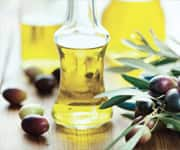Tuesday, September 22, 2015
A trial reported on September 14, 2015 in JAMA Internal Medicine found a significantly lower risk of invasive breast cancer among women who consumed a Mediterranean diet supplemented with extra-virgin olive oil in comparison with women assigned to a reduced fat control diet. "No prior nutrition intervention trial has addressed the effect of the Mediterranean diet specifically on breast cancer," authors Estefania Toledo, MD, MPH, PhD, and colleagues announce.
The trial included 4,282 women between the ages of 60 and 80 years enrolled in the multicenter Prevención con Dieta Mediterránea (PREDIMED) study who were at increased cardiovascular disease risk due to the presence of type 2 diabetes or other risk factors. Subjects were randomized to a Mediterranean diet (which is high in plant foods, fish and other healthy foods) supplemented with olive oil or nuts, or a control diet.
After a median follow-up period of 4.8 years, 35 cases of invasive breast cancer were identified. While both Mediterranean diets were associated with a significantly reduced risk of the disease, the diet supplemented with olive oil was associated with the lowest risk, which was 67% less (after adjustment) than the control group. Restriction of the analysis to women with estrogen receptor-positive malignancies further improved the protective effect of the olive-oil supplemented diet.
The authors suggest several mechanisms for extra virgin olive oil's anticarcinogenic effect. They observe that while all olive oil provides a high amount of monounsaturated fatty acids (mainly oleic acid) as well as squalene, extra virgin olive oil also provides biologically active compounds that include the polyphenols oleocanthal, oleuropein, hydroxytyrosol and lignans. The combined effects of oleic acid's antiproliferative property, squalene's beneficial effect on intracellular oxidative stress, and polyphenols' varying anticancer properties could be responsible for the protection associated with olive oil observed in this study.
"Preventive strategies represent the most sensible approach against cancer," the authors conclude. "The intervention paradigm implemented in the PREDIMED trial provides a useful scenario for breast cancer prevention because it is conducted in primary health care centers and also offers beneficial effects on a wide variety of health outcomes. Nevertheless, these results need confirmation by long-term studies with a higher number of incident cases." |







